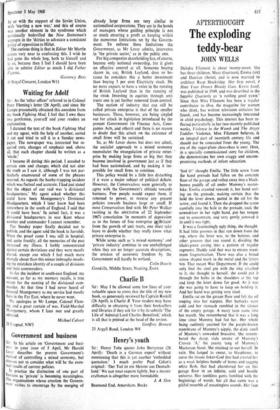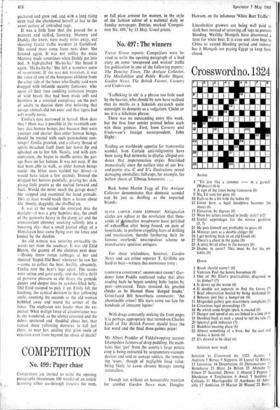The exploding teddy-bear
AFTERTHOUGHT JOHN WELLS
Deirdre Filament is about twenty-seven. She has three children, Marc (fourteen), Emma (six) and Damian (three), and is now married to architect Rasp Hockridge. Her first novel, I Hate Your Dreary Bloody Guts, Kevin Loof, was published in 1949, and was described in the Sapphic Quarterly as 'a rattling good yawn.' Since then Miss Filament has been a regular contributor to Ova, the magazine for women who think, has written television criticism for Spank, and has become increasingly interested in child psychology. This interest has been re- flected particularly in her two recently published works, Violence in the Womb and The Angry Toddler. Violence, Miss Filament believes, is an integral part of twentieth century life and should not be concealed from the young. The era of the sugar-plum choo-choo is over. Here, in a specially commissioned story for children, she demonstrates her own craggy and uncom- promising methods of infant education.
'Sod it!' thought Emilia. The little screw from the hand grenade had fallen on the concrete floor of the garage and rolled away into a black- brown puddle of oil under Mummy's motor- bike. Emilia crawled towards it, her hand rest- ing on the grenade, making certain that she held the lever down, patted in the oil for the screw, and found it. Then she dropped the screw carefully into the hole in the grenade, took the screwdriver in her right hand, put her tongue out to concentrate, and very gently screwed it in until it was tight.
It was a fascinatingly ugly thing, she thought. It had little grooves in that ran down from the top, where the lever was, to the bottom, and other grooves that ran round it, dividing the khaki-green casing into a pattern of regular segments. Daddy said that was to ensure maxi- mum fragmentation. There was also a broad arrow shaped mark in the metal and the letters WD. That meant War Department. If she could only find the steel pin with the ring attached to it, she thought to herself, she could put it through the holes in the shoulders at the top and keep the lever down for good. As it was she was going to have to keep on holding it. And her hand was getting very tired.
Emilia sat on the garage floor and felt the oil seeping into her nappies. Her buttocks were cold and her stomach rumbled in the silence of the empty garage. A nasty taste came into her mouth. She remembered that it was a long time since Mummy had fed her. Her whole being suddenly yearned for the purple-brown membrane of Mummy's nipple, the dank smell of Mummy's unwashed brassiere. She remem- bered the sharp, stale smoke of Mummy's Craven 'A,' the yeasty tang of Mummy's Mackeson Stout. She strained to wet herself. In vain. She longed to swear, to blaspheme, to curse the insane Joker-God that had created her as a weak helpless bundle of bones and sagging white flesh, that had abandoned her on this garage floor in an infinite, cold and hostile universe. Her toothless gums fumbled with the beginnings of words, but all that came was a pitiful mumble of meaningless sounds. Her face puckered and grew red, and with a long rising siren wail she abandoned herself at last to the sweet ecstasy of unbridled rage.
It was a little later that she paused for a moment and sniffed, listening. Mummy and Daddy, she knew, were many miles away, out shooting fascist traffic wardens in Guildford. The sound must come from next door. She listened again. It was not unlike the noise Mummy made sometimes when Daddy got into bed. A high-pitched 'Ha-ha-ha.' She heard it again. 'Ha-ha-ha-ha.' She felt a nameless sense of resentment. If she was not mistaken, it was the voice of one of the bourgeois children from the other side of the fence who Daddy said were drugged with infantile security fantasies: who spent all their time cuddling miniature images of wild beasts that had been made soft and harmless in a criminal conspiracy on the part of adults to deceive them into believing that savage animals did not exist and that tigers had soft woolly noses.
Emilia's eyes narrowed in hatred. How dare they? How was it possible in the twentieth cen- tury that human beings, just because they were younger and shorter than other human beings, should be treated with such paternalistic con- tempt? Emilia growled, and a silvery thread of spittle detached itself from her lower lip and splashed on to her bib. Slowly, and with con- centration, she began to shuffle across the gar- age floor on her bottom. It was not easy. If she had been able to walk, as older human beings could--the bitter tears scalded her throat—it would have taken a few seconds. Instead she dragged her bottom painfully, grazing her skin, giving little grunts as she rocked forward and back. Would she never reach the garage door? She stopped and examined the hand grenade. This at least would teach them a lesson about life. Slowly, doggedly, she shuffled on.
It was at the second she emerged into the daylight—it was a grey hopeless day, the smell of the gasworks heavy in the damp air and the crematoriuni chimney smoking sullenly into a lowering sky—that a small jointed effigy of a Himalayan bear came flying over the fence and landed by the dustbin.
An old woman was tottering unsteadily to- wards her from the roadway. It was old Enid Blyton, the granny of the children next door —Daddy threw rotten cabbages at her and shouted 'Stupid Old Boot' whenever he saw her —come to collect the bear. Swiftly, obscenely, Emilia tore the bear's legs apart. The seams were rotten and gave easily, and she- felt a thrill of perverse pleasure as she thrust the grenade deeper and deeper into its sawdust-filled belly. Old Enid stooped to pick it up. Emily felt the loathing, the cynical derision in that yellowing smile, counting the seconds as the old woman hobbled away and round the corner of the fence. The explosion was louder than she ex- pected. What malign force of circumstance was it, she wondered, as the silence returned and the debris spattered and thudded about her, that caused those yellowing dentures to fall just there, so near her, smiling that grim smile of rejection even from beyond the shock of death?







































 Previous page
Previous page